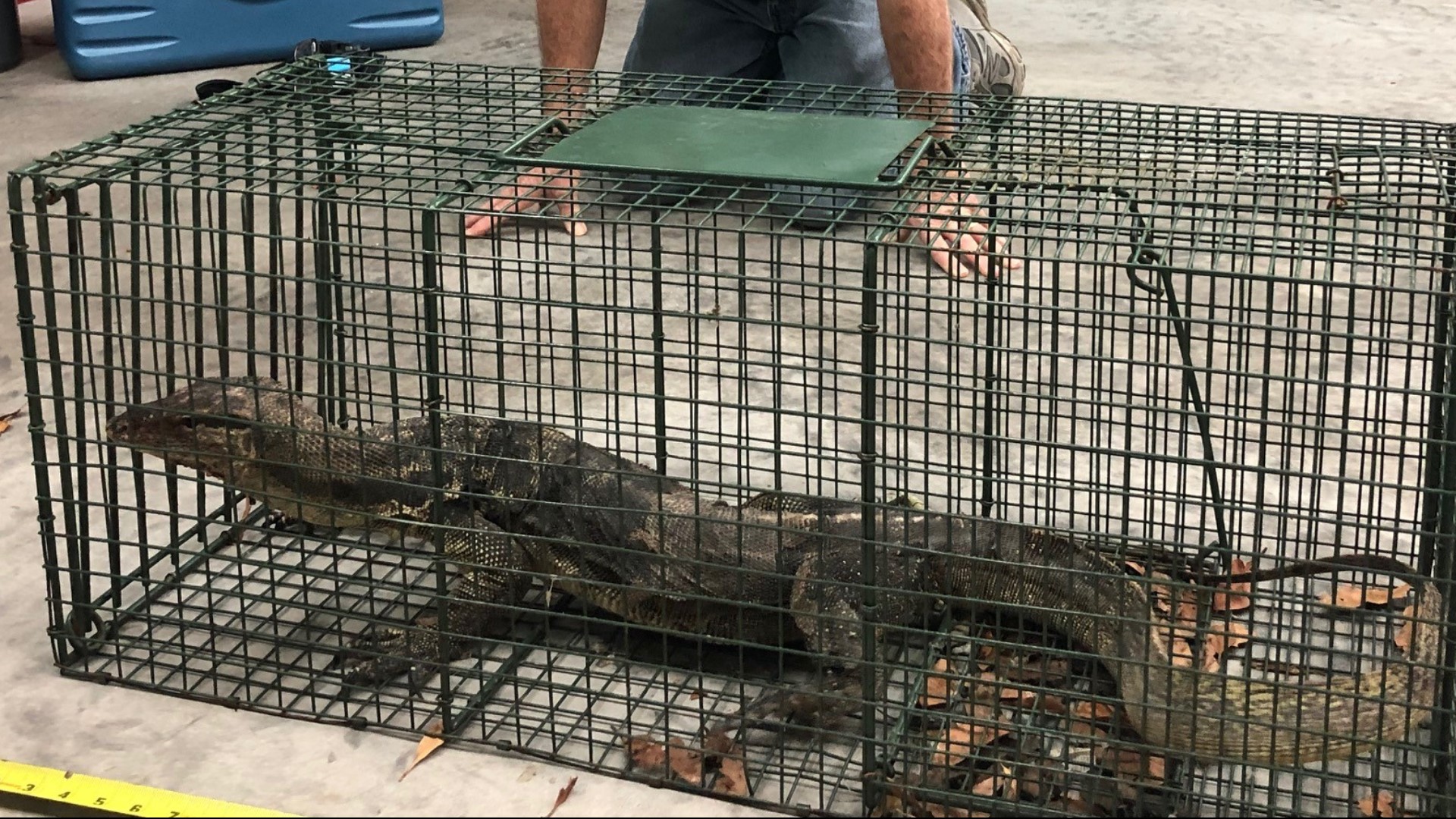Asian Water Monitor in Florida’s Ecosystem

Asian water monitor florida – The Asian water monitor (Varanus salvator) is a large, semi-aquatic lizard native to Southeast Asia. It was introduced to Florida in the 1990s and has since become established in the wild. Asian water monitors are voracious predators that can have a significant impact on native species and habitats.
The Asian water monitor is a large, semi-aquatic lizard found in Southeast Asia. It is a voracious predator, feeding on a variety of animals, including fish, frogs, and even small mammals. In some areas, the Asian water monitor has become a threat to native wildlife, including the endangered Siamese crocodile.
While the Asian water monitor is a fascinating creature, it is important to remember that it is a wild animal and should be treated with respect. For more information on the Asian water monitor, please visit this website.
Impact on Native Species, Asian water monitor florida
- Asian water monitors prey on a variety of native animals, including birds, reptiles, amphibians, and small mammals. They are also known to eat eggs and young of other animals.
- Competition with native predators: Asian water monitors compete with native predators for food and resources. This can lead to a decline in the populations of native predators.
- Alteration of food webs: The introduction of Asian water monitors has altered the food webs in Florida. They have become a top predator in many areas, and their presence has led to changes in the abundance and distribution of other species.
Impact on Habitats
- Asian water monitors can damage native vegetation by trampling and digging. They can also create burrows that can alter the hydrology of an area.
- Burrowing: Asian water monitors are known to create extensive burrow systems, which can alter the hydrology of an area and damage native vegetation.
- Habitat destruction: Asian water monitors can damage native habitats by trampling vegetation and creating burrows.
Potential Consequences of Continued Presence
The continued presence of Asian water monitors in Florida is likely to have a number of negative consequences. These include:
- Decline in native species populations
- Alteration of food webs
- Damage to native habitats
Control and Management Strategies: Asian Water Monitor Florida

In Florida, the management of Asian water monitor populations has become crucial to protect native ecosystems and human safety. Several strategies have been implemented to control their numbers, each with varying degrees of effectiveness and challenges.
One common approach involves habitat modification, such as removing dense vegetation that provides cover for these reptiles. This strategy aims to reduce their ability to hide and breed, making them more vulnerable to predation or capture.
Trapping and Removal
Trapping and removing Asian water monitors is another widely used method. Traps are baited with food or live prey to attract the reptiles, and once captured, they are euthanized or relocated to designated areas.
While trapping can be effective in reducing local populations, it is labor-intensive and requires ongoing effort to prevent re-establishment. Additionally, the use of traps can inadvertently capture native wildlife, raising concerns about non-target impacts.
Hunting and Public Outreach
In some areas, regulated hunting is permitted as a means of controlling Asian water monitor populations. This approach relies on licensed hunters to target and remove these reptiles from the wild.
Public outreach and education play a vital role in supporting management efforts. By raising awareness about the ecological and public health risks posed by Asian water monitors, the public can contribute to early detection, reporting, and prevention measures.
Biological Control
The introduction of natural predators, such as Burmese pythons, has been explored as a potential biological control method for Asian water monitors. However, this approach raises concerns about unintended consequences, as introduced predators may themselves become invasive and pose threats to native species.
Challenges and Recommendations
The effectiveness of Asian water monitor management strategies depends on various factors, including the size and density of the population, the availability of suitable habitat, and the level of public cooperation.
One significant challenge lies in the difficulty of detecting and monitoring Asian water monitor populations, as they are often elusive and secretive. Additionally, the lack of reliable population data makes it difficult to assess the impact of management efforts and adjust strategies accordingly.
To improve management outcomes, several recommendations can be considered:
- Enhance coordination among agencies and stakeholders involved in Asian water monitor control.
- Increase funding for research and monitoring to gather accurate population data and evaluate the effectiveness of management strategies.
- Develop and implement standardized protocols for trapping, removal, and euthanasia to ensure humane and effective practices.
- Expand public outreach and education campaigns to raise awareness and encourage responsible actions to prevent the spread of Asian water monitors.
Conservation and Education
Conserving native species threatened by Asian water monitors is crucial for maintaining the balance and biodiversity of Florida’s ecosystem. These non-native predators pose a significant threat to local wildlife, including endangered and protected species.
The introduction of educational campaigns is essential to raise awareness about the issue. These campaigns should target the general public, policymakers, and stakeholders involved in environmental conservation. By educating individuals about the potential ecological impacts of Asian water monitors, we can foster a sense of stewardship and encourage responsible actions to protect native species.
Educational Campaign for Asian Water Monitor Awareness
Target Audience:
– General public
– Policymakers
– Environmental conservationists
Messaging:
– Highlight the ecological impacts of Asian water monitors on native species.
– Emphasize the importance of responsible pet ownership and preventing the release of non-native species into the wild.
– Provide information on reporting sightings of Asian water monitors.
Outreach Methods:
– Public service announcements
– Educational materials (brochures, posters, fact sheets)
– Social media campaigns
– Community outreach events
| Target Audience | Messaging | Outreach Methods |
|---|---|---|
| General public | Ecological impacts, responsible pet ownership | Public service announcements, educational materials, social media campaigns |
| Policymakers | Policy implications, management strategies | Briefings, reports, stakeholder meetings |
| Environmental conservationists | Monitoring, research, conservation efforts | Workshops, conferences, collaborative projects |
In the sun-dappled swamps of Florida, the Asian water monitor prowls, its sleek body gliding through the shallows. These formidable predators share a curious connection to the world of business: Brian Niccol, the CEO of Chipotle, once served as the head of Yum! Brands, which owns Taco Bell and Pizza Hut.
Niccol’s tenure at Chipotle has seen the company embrace sustainability and healthy ingredients, mirroring the growing awareness of environmental issues surrounding the Asian water monitor’s native habitat.
The Asian water monitor, a large lizard native to Southeast Asia, has been spotted in Florida, raising concerns among wildlife officials. While its presence may be unrelated to the recent Florida Georgia Line break up , it highlights the importance of responsible pet ownership and the potential impact of invasive species on native ecosystems.
The Asian water monitor is a voracious predator that can decimate local wildlife populations, making its presence in Florida a serious concern.
Asian water monitors in Florida are a threat to the native ecosystem, but they’ve also become a popular topic of discussion online. Just like the buzz surrounding Hailey Bieber’s engagement ring , which has sparked countless articles and social media posts, the presence of these invasive lizards has garnered widespread attention.
Both topics have captivated audiences, demonstrating the power of online platforms to amplify both environmental concerns and celebrity gossip.
The Asian water monitor, a formidable reptile native to Southeast Asia, has gained notoriety in Florida, where it poses a threat to native wildlife. Its presence has sparked discussions about responsible pet ownership and the consequences of releasing exotic animals into the wild.
Coincidentally, the recent trend of name changes, particularly the shiloh name change , highlights the importance of identity and the significance of names in shaping one’s life. Just as the Asian water monitor has disrupted the delicate balance of Florida’s ecosystem, the changing of one’s name can have profound implications for an individual’s journey and sense of belonging.